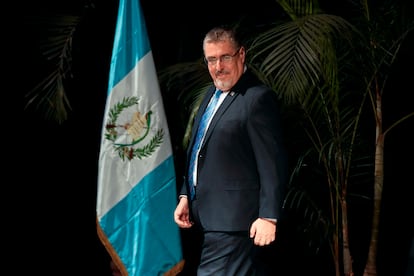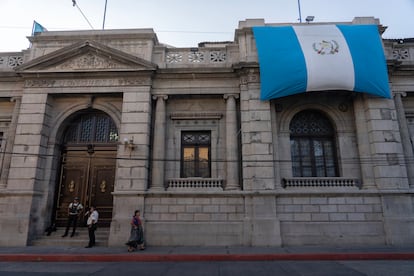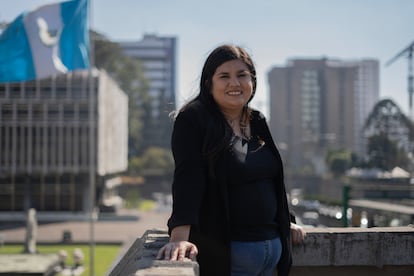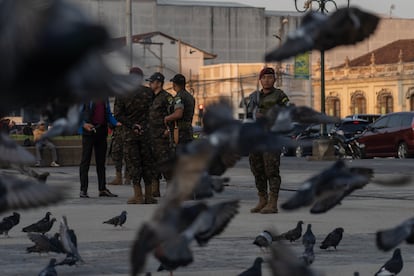Bernardo Arévalo sworn in as president of Guatemala, but continues to face obstacles
The progressive sociologist will take the reins of the country after overcoming numerous judicial attempts to invalidate his victory. His promise to fight corruption will be heavily challenged


On Sunday, progressive sociologist Bernardo Arévalo, 65, is set to be sworn in as president of Guatemala in a ceremony at the Miguel Ángel Asturias Cultural Center in Guatemala City, the capital. If there are no last-minute surprises — something that few dare to rule out, after a long transitional period loaded with judicial obstacles, which the president-elect himself denounced as an attempted coup d’état — the leader of the Seed Movement will be given the presidential sash in an event attended by a dozen Latin American leaders and the King of Spain.
Arévalo — a diplomat with expertise in conflict resolution, who has also been a legislator — will assume the presidency with the main promise of fighting corruption. He aims to do this to subsequently tackle the problems of the most populous country in Central America. Guatemala has more than 17 million inhabitants, high rates of poverty and inequality, as well as great development needs in the fields of education, healthcare and infrastructure.
The new president’s campaign brought him face-to-face with what in Guatemala they call the “corrupt pact” — an informal alliance of politicians, bureaucrats and business elites who protect each other in order to maintain power. The most recent signs of this confrontation came after Arévalo’s unexpected victory in the first round of the presidential elections in June 2023. When he triumphed in the runoff in August, the Public Ministry — headed by Attorney General Consuelo Porra — began a series of attempts to derail the transition of power through judicial means.

These attempts failed, mainly thanks to the citizenry’s firm defense of democracy and the electoral will of Guatemalans. Indigenous movements mobilized throughout the country to protect democracy. For more than 100 days, these organizations held different actions, including a sit-in in front of the Public Ministry in Guatemala City. The international community also condemned the attempts by the attorney general to prevent the inauguration of the president-elect and disqualify his party.
While a ruling issued by the Constitutional Court in mid-December offered guarantees for Arévalo to be sworn in on Sunday, Guatemalans still face uncertainty about whether the inauguration will be respected, or whether powerful groups will attempt to stop it with some last-ditch judicial attack. Among the unknowns is also whether the outgoing president — Alejandro Giammattei, under whose government there has been an increase in authoritarianism — will attend the inauguration. There are also questions about whether the Seed Movement will be able to operate in a Congress in which it only has 23 seats out of 160.
A government with high expectations and no honeymoon period
In any case, the team assembled by Arévalo recognizes that, even if one obstacle course is ending, another is beginning. “We understand that what’s coming is much heavier. It’s not going to be easy being opposed by several state institutions that declared themselves to be coup plotters from day one,” laments Andrea Reyes, an elected representative for the Seed Movement. The 33-year-old lawyer — who emerged from the student movements — has spent the last six months defending her party from attacks levied by the Public Ministry.

Arévalo has assured the public that, after taking office, he will demand the resignation of Attorney General Consuelo Porras, who — back in 2022 — was sanctioned by the United States “for participating in significant acts of corruption.”
“One of my first acts — if not the first — will be to demand the resignation of the attorney general,” the president-elect said a few weeks ago. That will, in all likelihood, be his first response to the resistance put up by the corrupt pact.
Reyes affirms that the arrival of the Seed Movement to the executive branch represents a new way of doing politics. She says that governance will now be based on the dialogue of ideas. According to her, the past 40 years have been based on “negotiations and money.”
“Politics has been a business and a happy confluence of interests of the people who have an interest in controlling some type of state institution. That’s what has driven politics in Guatemala since 1985 until now. It’s somewhat complicated for ideologically-motivated people to come to power and begin to establish a legislative framework so that Guatemala can move forward in accordance with our principles. It’s unprecedented,” she says. Reyes vows that the new way of doing politics will involve speaking with different actors and reaching consensus.
In addition to achieving governability — with part of the judiciary against it and with a minority in Congress — political analyst Raquel Zelaya believes that the Arévalo administration will have to learn to manage the overexpectations of the sector of the population that supported the Seed Movement. Arévalo will also need to remember to give back to the Indigenous movements.
“The Indigenous population played their part. They’ve shown impressive civic capacity and they were fundamental for some of the triumphs [that were achieved] and the obstacles that were overcome,” says Zelaya, the chair of the Association for Research and Social Studies (ASIES) at the Rafael Landívar University.
The first decision of the Arevalo government in this regard disappointed a sector of the population. It was the announcement of his cabinet, a parity team of seven men and seven women, among which there is only one Indigenous person, the Minister of Labor and Social Welfare, Miriam Roque. The president-elect himself acknowledged that he was “indebted to the pluriculturality” of the country, and said that he plans to incorporate these community members at other levels of government. Meanwhile, the Board of Directors of Communal Mayors of the 48 Cantons of Totonicapán, the Indigenous organization that has led the resistance in defense of the democracy promoted by his presidency, has regretted that the Cabinet does not reflect the peoples that make up the country, the Maya, the Garifuna and the Xinka.
For Zelaya — beyond the appointment of ministers — the administration must implement “policies that help to achieve a pluralistic Guatemala, as was done during the time of the peace agreements.” In that sense, she advocates for the pro-dialogue nature that Arévalo has demonstrated in his career. “Arévalo — as a conciliatory character — has always brought different positions together. That’s been the strength of his international career. But I believe that he has a party base that — on the contrary, due to its youth, without much experience — is quite adverse to these positions. So, he’ll also have to manage those currents of thought that are quite strong within his party,” Zelaya opines, in reference to the different sectors of the Seed Movement.
In addition, Zelaya says government transparency is key. “That’s how he will earn respect,” she argues. “The most realistic thing is for him to promise and deliver on a transparent executive, which, in the long run, is the same as fighting corruption. The issue is it’s deeply rooted and that’s why there are overexpectations.”

“Guatemala needs this administration to be successful. These are the last chances we have for a minimum democratic balance,” adds Zelaya. “If this administration does not succeed, our situation could be very precarious because organized crime has become very empowered. Many of the incoming district deputies are linked to them, and we have to pay much more attention to them than any other issue.”
Above all, the new president will have to deal with high expectations, which even legislators from his party — such as Andrea Reyes — recognize. “I feel like we’re pulling the country out of the mud. It’s very complicated. The fear we have is that, by the end of the [governing] period, we’ll have spent all our time defending the government, without having been allowed to work. That’s a reality that we’ll have to deal with in the next four years to guarantee sufficient results to get Guatemala out of underdevelopment.”
Sign up for our weekly newsletter to get more English-language news coverage from EL PAÍS USA Edition
Tu suscripción se está usando en otro dispositivo
¿Quieres añadir otro usuario a tu suscripción?
Si continúas leyendo en este dispositivo, no se podrá leer en el otro.
FlechaTu suscripción se está usando en otro dispositivo y solo puedes acceder a EL PAÍS desde un dispositivo a la vez.
Si quieres compartir tu cuenta, cambia tu suscripción a la modalidad Premium, así podrás añadir otro usuario. Cada uno accederá con su propia cuenta de email, lo que os permitirá personalizar vuestra experiencia en EL PAÍS.
¿Tienes una suscripción de empresa? Accede aquí para contratar más cuentas.
En el caso de no saber quién está usando tu cuenta, te recomendamos cambiar tu contraseña aquí.
Si decides continuar compartiendo tu cuenta, este mensaje se mostrará en tu dispositivo y en el de la otra persona que está usando tu cuenta de forma indefinida, afectando a tu experiencia de lectura. Puedes consultar aquí los términos y condiciones de la suscripción digital.








































